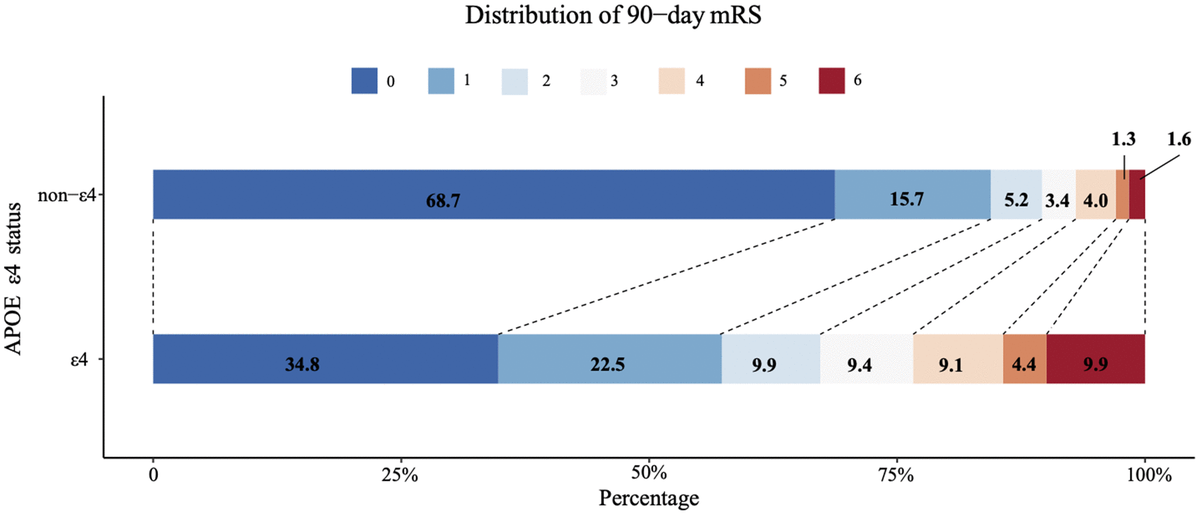Researchers publishing in Aging have found that there is a correlation between the APOE4 gene and poor outcomes after ischemic stroke.

The APOE4 Gene Is Associated With Worse Stroke Outcomes
#1
Posted 19 January 2023 - 08:31 PM
Other than its well-known association with Alzheimer’s disease, the APOE4 allele, which codes for the ApoE4 apolipoprotein variant, is associated with unfavorable outcomes in other neurological problems as well, including Parkinson’s disease [1] and amyotrophic lateral sclerosis (ALS) [2]. It is even associated with worse outcomes after acute injuries, such as brain bleeds [3].
However, the relevant data on stroke is muddled and contradictory. These researchers hold that some previous studies on the subject had small sample sizes and confounding factors that impaired the results. These researchers, therefore, sought to take another look at the subject, focusing on outcomes three months after acute ischemic stroke.
A four-figure dataset
Between January 2017 and March 2020, 2,295 people were screened for APOE genotype. 2,001 of them received 3-month follow-ups. 72 people with thrombosis-related issues were excluded. Of the remaining 1,929 people, almost two-thirds had two copies of APOE3, with most of the others having at least one copy of APOE3. Dual carriers of APOE4 and APOE2, along with APOE4/APOE2 carriers, made up less than 4% of the total sample.
People with at least one copy of APOE4 were significantly more likely to have biomarkers of inflammation along with increased LDL cholesterol and triglycerides. Other biomarkers were not found to be statistically significant.
Using the modified Rankin scale to assess disability and death, the researchers found that more than two-fifths of APOE4 carriers were at least slightly disabled, compared to less than one-sixth of noncarriers. Nearly a third of carriers were at least moderately disabled, but only a tenth of noncarriers were. A tenth of carriers had died within the three months, compared to less than 2% of noncarriers.

Interestingly, inflammation was found to be a significant contributing factor only among APOE4 carriers. APOE4 carriers in the highest quartile of the inflammatory biomarker NLR were found to be almost twice as likely to have poor outcomes.
Conclusion
While APOE2 was not differentiated from APOE3, this research seems fairly conclusive in its findings, showing that an allele known for poor outcomes in other areas is connected to poor outcomes in acute ischemic stroke. The logical question is whether or not anything can be done about it. If APOE4 can be properly classfied as a genetic disease, gene therapy or mRNA-based therapies may be worth the effort in minimizing human suffering and maximizing healthy lifespan.
Literature
[1] Kim, R., Shin, J. H., Park, S., Kim, H. J., & Jeon, B. (2020). Apolipoprotein E ε4 genotype and risk of freezing of gait in Parkinson’s disease. Parkinsonism & Related Disorders, 81, 173-178.
[2] Chio, A., Brunetti, M., Barberis, M., Iazzolino, B., Montuschi, A., Ilardi, A., … & Calvo, A. (2016). The role of APOE in the occurrence of frontotemporal dementia in amyotrophic lateral sclerosis. JAMA neurology, 73(4), 425-430.
[3] Biffi, A., Murphy, M. P., Kubiszewski, P., Kourkoulis, C., Schwab, K., Gurol, M. E., … & Rosand, J. (2019). APOE genotype, hypertension severity and outcomes after intracerebral haemorrhage. Brain communications, 1(1), fcz018.
View the article at lifespan.io













































